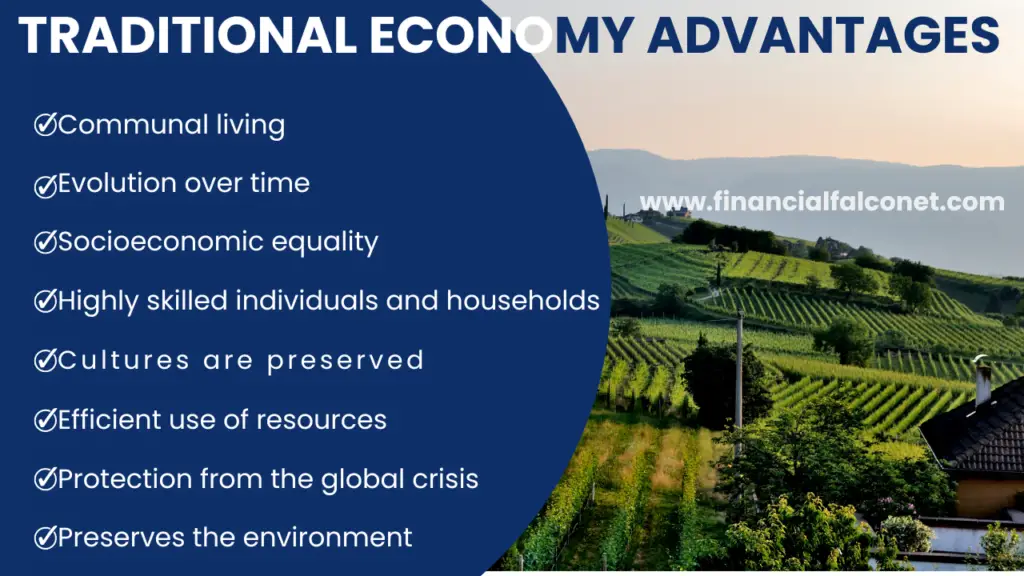Traditional economy advantages range from cultural preservation to the development of a highly skilled workforce in the various aspects that make up the economy. A traditional economy is one that all other economic systems such as free market, command, and mixed economies arose from. Hence it is considered the most basic type of economic system that may exist in any given society. Similar to other types of economies, a traditional economy has pros and cons that are peculiar to it. In a traditional economy, the production of goods and services is generally at the subsistence level.
Individuals and households produce goods and services that are required for their use and the rest of the community. The traditional economic system is based on ancient beliefs, history, traditions, and customs that guide economic activities and all other aspects of life. It generally relies on basic activities such as fishing, gathering, farming, and hunting. Thus, this economic system is often considered outdated and is often found in isolated societies that are mostly developing or underdeveloped.
Due to the nature of the economy, trading activities are usually carried out based on the barter system; people exchange goods for goods or services for services instead of using fiat money. Additionally, production is mainly geared toward meeting individual and communal needs and not toward making a profit. In this article, we shall discuss the traditional economy advantages.
See also: Advantages of Socialist Economy

Traditional economy advantages
- Cultures are preserved
- Highly skilled individuals and households
- Efficient use of resources
- Preserves the environment
- Socioeconomic equality
- Protection from the global crisis
- Communal living
- Evolution over time
Cultures are preserved
The most common advantage of a traditional economy is the preservation of culture. Unlike other economies that are open to accepting foreign cultures that may erode their own culture in the long run, a traditional economy ensures that the people’s culture is preserved. In a traditional economy, customs, and traditions guide the way of life and all economic activities. Older members of society also pass down these traditions and customs to the younger ones who are saddled with the responsibility of passing on these cultures to subsequent generations.
In this way, the cultural heritage of the society is protected, preserved, and practiced from one generation to the next thereby ensuring that their culture does not get watered down or eroded with time. Hence, a traditional economy provides the advantage of cultural preservation.
Highly skilled individuals and households
One of the traditional economy advantages is the existence of highly skilled individuals and households. In the same vein as the preservation of culture, skills are usually taught and passed down from one generation to the next. This means that individuals get exposed to specific areas of trade at a very tender age. For example, a child born to a family of cloth weavers is expected to join the family in weaving cloth once they are able to handle any part of the process. This early exposure makes it possible for individuals and households to be exceptionally skilled in their particular area of expertise be it hunting, farming, fishing, cattle rearing, blacksmithing, baking, etc.
Based on the above, there is usually a clarity of roles and responsibilities within a traditional economy. This ensures that every individual or household contributes their quota to the functioning of the community by using their skills and talents judiciously. In turn, individuals often drive satisfaction from their jobs knowing that they are actively contributing to the well-being of their community. They are also able to improve their skills more easily since the older members of the community are there to serve as guides to the younger ones in their various work areas. Therefore, a traditional economy is advantageous due to its encouragement of early skill acquisition.
Efficient use of resources
One of the advantages of a traditional economy is the efficient use of resources. Traditional economies are largely known for production to meet individual and communal needs, these inherent production motives serve as a precursor to ensuring that the available resources are efficiently utilized in a way that provides maximum benefits. This further ensures that there is no surplus production which additionally aids in preventing wastages that may occur. In these ways, traditional economies are advantageous as they ensure efficient use of resources and stop wastage.
Preserves the environment
An advantage of the traditional economy is the preservation of the environment. Traditional economies are dependent on the natural environment in which they exist, however, the products that they create are often at a subsistence level. This means that the impact of production on the environment is generally minimal as individuals make use of what is readily available in the environment for their sustenance. For example, instead of clearing new forest areas for farming and using synthetic fertilizers to enhance crop production, traditional economies often utilize already cultivated lands that have been used for years by their ancestors. They also use organic fertilizers which are more environmentally friendly, and more beneficial to healthy food production.
Generally, traditional economies do not carry out large-scale productions that require modern tools, machinery, products, and factories that may be harmful to the environment. Due to this limited use of modern mass production tools, the economic activities that occur in this kind of economy are not prone to the negative externalities of production. Hence, one of the advantages of a traditional economy is environmental preservation and protection.
Socioeconomic equality
Another traditional economy advantage is the socioeconomic equality that exists. Unlike free economies where there is a wide social class disparity between capitalists and the rest of the masses, traditional economies ensure that every individual is in the same social class. This is because there is no avenue for wealth accumulation due to the fact that most production is on a subsistence level and there is no currency for exchange.
Protection from the global crisis
Traditional economies are usually self-sustained and disconnected from the rest of the world, this provides protection from global crises and is one of the advantages of the traditional economy. For countries that have a free economy, there is generally a significant level of interaction with other countries for various economic activities such as trade or tourism. Due to this, changes in the prices of commodities and other products in the global market generally affect the prices as well as the availability of certain goods or services. Additionally, contagious diseases can be easily spread from one country to another as was the case in the recent 2019/2020 pandemic which a lot of countries battled with.
Exposure to these global shocks is absent in a traditional economy since individuals and households produce what they need without being dependent on foreign products or services. The use of trade by barter in the exchange of goods and services also serves as a means of preventing inordinate changes in the price of goods as well as the occurrence of inflation. The simple economic setup and the predictable nature of the community also aid in ensuring the smooth running of the community. Furthermore, the insulation of traditional economies from contact with foreigners also serves as a good way of defending their population from pandemics and other diseases. All these are traditional economy advantages.
Communal living
An additional traditional economy advantage is the community it provides for individuals. Humans are known to be social beings who thrive in a community that allows for the creation and maintenance of significant social bonds with other humans. Since the traditional economy is centered around the provision of individual and household needs, it fosters the community spirit as all individuals contribute their quota in ensuring that the needs of everyone are adequately met. This is especially true as every individual is dependent on another individual for the specific skill and talents that they contribute to the community. Co-dependence and cooperation are therefore encouraged and sustained to strengthen the communal bond.
Additionally, the homogenous nature of a traditional economy fosters communal living as there are minimal cases of disagreements or friction among individuals. This is because the way of life is guided by customs and traditions that are commonly held by everyone. Thus, every person knows the guiding principles of the community and abides by them. Communal living further prevents greed and selfishness by eliminating competition among individuals and replacing it with cooperation.
Evolution over time
Another advantage of the traditional economy is its evolution over time. All types of economies in existence today were traditional economies at some point in history. This shows that traditional economies do not exist in perpetuity, instead, they evolve into other economic systems over time. Despite the subsistence nature of a traditional economy, over time, as individuals become more skilled in their various duties, surpluses of production begin to arise which brings about the need to trade with other communities. This opens up the economy and changes begin to occur which transforms the economy into either a socialist, command, free, or mixed economy.
See also: Advantages of a Command Economy
What are the advantages of a traditional economy?
The advantages of a traditional economy include the preservation of people’s culture, the development of highly skilled individuals, the efficient use of resources in production, and the preservation of the environment. Additional traditional economy advantages are socioeconomic equality, protection of individuals and the economy from the global crisis, communal living, and the evolution of the economy over time into other economic systems.
See also: Advantages of a Command Economy
Last Updated on November 2, 2023 by Nansel Nanzip BongdapBlessing's experience lies in business, finance, literature, and marketing. She enjoys writing or editing in these fields, reflecting her experiences and expertise in all the content that she writes.

